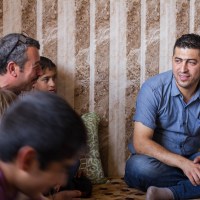Recently Canadian Prime Minister Justin Trudeau apologized on behalf of his country for their rejection of Jewish refugees in 1939.
1939—that’s almost 80 years ago. Some people could argue that since Trudeau wasn’t even born yet, much less present when the decision was made to turn away Jewish refugees, why apologize?
Is an apology worth it if it’s so late?
Do we even need to apologize for something other people did?
I’m afforded a lot of privilege because of my skin color, my income bracket, the place I live. I don’t experience the same struggles as others in my community, the same wounds or difficulties. It can be easy to live within my bubble, to assure myself of my innocence when others around me experience racial profiling, prejudice, contempt, or harassment.
I didn’t say anything. I didn’t do it. Not my fault. Not mine to apologize for.

The truth is we’re all connected. The pain someone else experiences, whether at my own hands or not, is worth listening to. And it’s worth apologizing for, not because I’m necessarily responsible, but because my silence is complicity.
When we hold our tongues, when we turn away, when we refuse to take a risk and speak up, we’re allowing biases to perpetuate, violence to continue, and false narratives to be written.
One of the greatest gifts we can give others is to hold space for them. To listen, to accept their experience. To quiet our discomfort and to enter into their pain, their story. And when we do speak, to apologize for their pain and hurt, for all the ways they have been broken, for all the ways we or others have watched instead of intervened.
Let us be a people who lament the things they lament, who believe they have something to offer us, to teach us. In feeling what others feel, in pressing in to the pain together, we are able to stop the cycles of pain and violence. But we have to be listening.
And we don’t listen just because we want to end war and violence, although that’s certainly a goal. We listen because each person has value. Each person is inherently worthwhile. We listen because stories matter, people matter.
We listen because in that quiet, in that hallowed space where we lay down our excuses and justifications—where we offer empathy and yes, apologies—we find a love that is tender, precious, and peacemaking.


